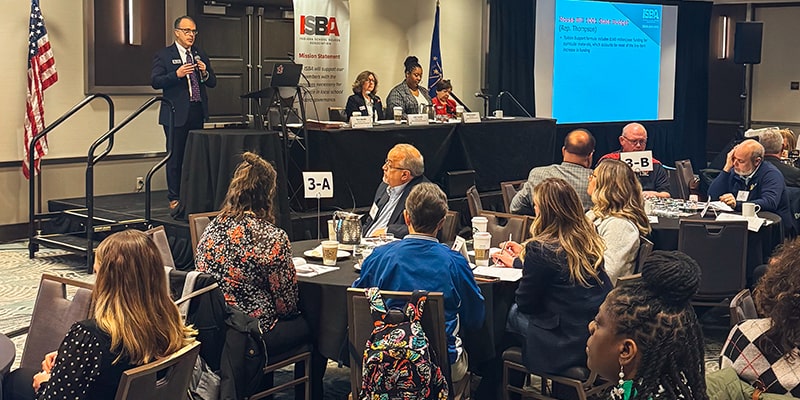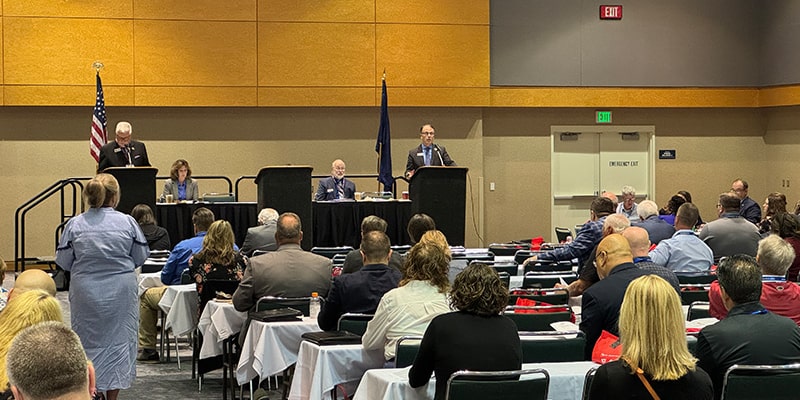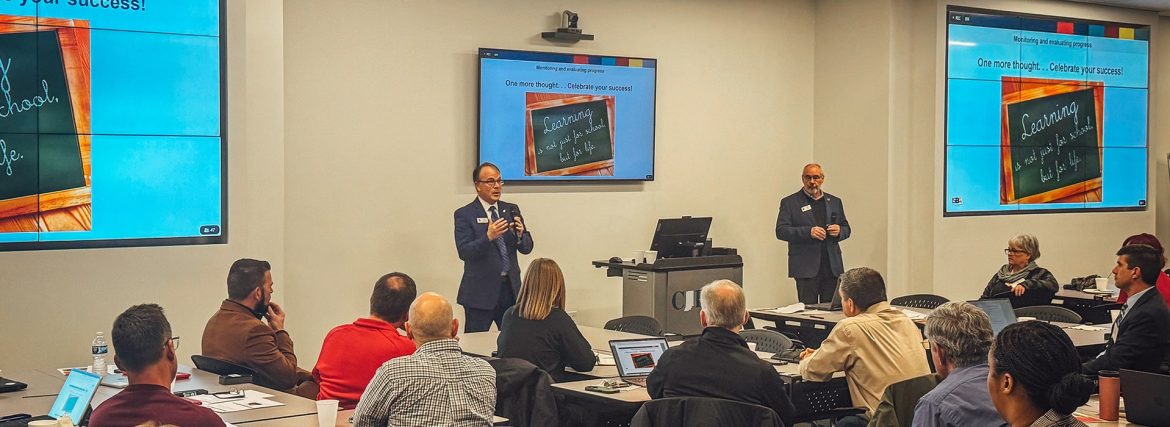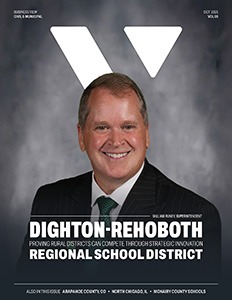Educational at its Heart
Advocating for Excellence in Public Education
In Indiana, the work of nearly 1,700 school board members and more than 2,000 local school officials shapes the future of K-12 education. Behind their efforts stands the Indiana School Boards Association (ISBA), a statewide organization dedicated to equipping school boards with the tools, training, and advocacy support they need to govern effectively.
Founded in 1949 and established as an autonomous nonprofit in 1967, ISBA has grown into the premier voice for public education governance in Indiana. Its mission is clear: to promote excellence in local school governance and serve as a powerful advocate for Indiana’s public schools and the students they serve.
Executive Director Terry Spradlin explains, “Our goal is to empower school boards with the knowledge, resources, and training they need to make the best possible decisions for their communities. Every policy, every law, and every initiative should come back to what is best for the students of Indiana.”
A Mission Rooted in Governance and Advocacy
ISBA’s vision extends beyond policy manuals and legislative briefings. At its heart, the association is committed to strengthening public education by elevating board governance, advancing advocacy, and supporting leadership development.
Membership spans the entire state, encompassing both urban and rural districts. Whether a large metropolitan board or a small rural one, each member receives guidance on legal compliance, policy development, board training, and legislative advocacy. In a state with more than 1,500 pages of education law and administrative rules, ISBA provides essential clarity and direction.
Navigating Legislative Challenges
One of the most pressing policy issues currently facing Indiana schools is the state’s proposed block grant for K-12 education. Introduced by the Department of Education, this initiative seeks to consolidate funding streams into a simplified model.
While the proposal promises efficiency, ISBA is closely monitoring its potential impact. “We have to ensure that the block grant system does not inadvertently disadvantage certain populations, including English language learners and students from lower socioeconomic backgrounds,” says Spradlin.
The proposal is still open for public comment, and ISBA is playing a key role in helping districts understand what the changes might mean while advocating to protect resources for vulnerable students.

Building a Future-Ready Workforce
Indiana is deeply invested in preparing students not only for college but also for the workforce. ISBA has made career and technical education (CTE) and workforce preparedness a legislative priority heading into the 2026 session.
The state recently revamped its modern youth apprenticeship program, which creates valuable opportunities for high school students to engage in work-based learning. Through partnerships with local businesses, industries, and higher education, students gain real-world experience while earning credits toward graduation.
However, challenges remain, particularly in small rural districts where limited partnerships and logistical hurdles make it harder to offer such experiences. ISBA continues to advocate for resources and creative solutions to ensure that all students—regardless of geography—can benefit.
Spradlin underscores the importance of balance: “Workforce training is critical, but we must also maintain strong pathways to college enrollment and completion. Our goal is to give students choices, not limit them.”
Addressing Teacher Shortages
Like much of the country, Indiana faces a persistent teacher shortage. Fewer students are entering teacher preparation programs, and districts are competing for a smaller pool of qualified educators.
ISBA has supported significant policy efforts to turn the tide. The Next Level Teacher Compensation Commission established targets to raise teacher pay, and the legislature responded by allocating increased funding. The goal: make teaching in Indiana more attractive and competitive.
Alternative certification pathways are also being explored to fill positions in high-demand areas. But Spradlin emphasizes that teacher retention remains just as important as recruitment. “We need to create conditions where teachers feel valued and supported throughout their careers. Pay matters, but so do working conditions, professional growth, and respect for the profession.”
Harnessing the Power of Technology and AI
Indiana schools have long embraced technology, with many districts implementing one-to-one device initiatives well before the pandemic. Today, classrooms are equipped not just with laptops and tablets, but with robotics kits, simulators, and other tools that expand learning possibilities.
ISBA is taking a proactive stance on the next frontier: artificial intelligence. Earlier this year, the association hosted a statewide seminar exploring AI in education, highlighting both opportunities and pitfalls.
Rather than a one-size-fits-all approach, ISBA is advising districts to form AI integration committees to guide decision-making. These groups can evaluate tools, address ethical concerns, and build policies that reflect local values.
“AI is here, whether we are ready or not,” Spradlin notes. “It has the potential to transform instruction and operations, but we must be thoughtful in how we introduce it. Our responsibility is to ensure equity, safety, and transparency.”
Professional Development and Training
ISBA’s work extends well beyond the legislative arena. Each year, the association hosts a robust lineup of training programs and events tailored to school board members.
- Annual conferences bring together board members, superintendents, and education leaders for networking, training, and shared problem-solving.
- Leadership academies and new board member training sessions provide targeted resources for those stepping into governance roles for the first time.
- Regional meetings ensure that members across the state stay connected to ISBA’s resources and one another.
In addition, ISBA offers ongoing legal services and policy guidance to help boards navigate compliance issues and implement best practices in governance.

Strategic Plan: 2025–2028
ISBA’s forward-looking strategic plan provides a roadmap for growth and impact over the next three years. The plan focuses on three pillars:
- Elevating board governance through expanded training and resources.
- Enhancing advocacy to amplify the collective voice of school boards at the statehouse.
- Improving communications to strengthen relationships with members, legislators, and the public.
To achieve these goals, ISBA plans to expand staff capacity and optimize its organizational operations. Its board of directors, composed of local school board members, sets strategic direction and ensures the association reflects the needs of its membership.
Recent membership surveys show high levels of satisfaction with ISBA’s services, a testament to its role as a trusted partner in public education governance.
A Trusted Voice for Indiana’s Schools
As Indiana schools confront teacher shortages, evolving legislation, and the integration of new technologies, ISBA remains steadfast in its mission. It provides the expertise and advocacy needed for school boards to make decisions that affect nearly a million students across the state.

“Public education is the cornerstone of our democracy,” says Spradlin. “When we strengthen our school boards, we strengthen our schools—and ultimately, our communities.”
ISBA’s story is one of resilience, adaptation, and leadership. From guiding districts through legislative complexity to preparing them for the challenges of AI and workforce development, the association continues to shape the future of Indiana education.
Looking Ahead
The next few years promise to be pivotal for Indiana’s schools. The block grant decision, teacher pay reforms, and expansion of work-based learning programs will all shape the trajectory of education in the state.
Through it all, ISBA is committed to ensuring that school boards are equipped not only to respond but to lead. By promoting excellence in governance and advocacy, the association helps Indiana schools meet challenges head-on while seizing opportunities to innovate.
For the thousands of board members and officials who make decisions every day on behalf of students, ISBA is more than a resource—it is a partner in building a stronger, brighter future for public education in Indiana.
AT A GLANCE
Who: Indiana School Boards Association (ISBA)
What: The voice of educational professionals across the state to help progress education and support its members
Where: Indianapolis, Indiana
Website: www.isba-ind.org


